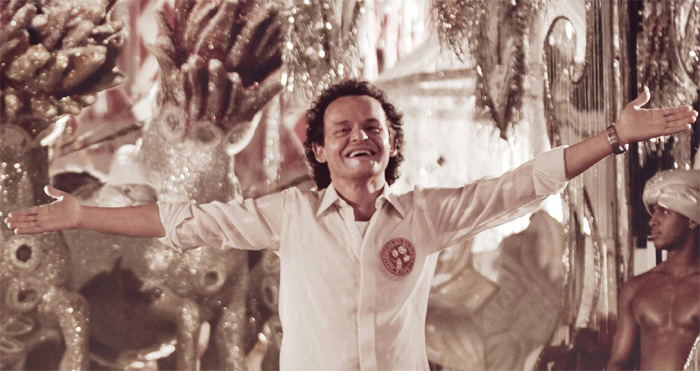Directed by Paulo Machline
Screened at the Liverpool Samba School (Lodge Lane Library) for the Brazilica Festival
Reviewed by Francesca Middleton
Trinta (Paulo Machline, 2014) is a film about a life dedicated to sparkle. It is the story of Joãozinho Trinta, the acclaimed artistic director of the Samba Schools of the Rio Carnival, as he brings the Salgueiro School to 1974’s carnival streets.
He has a vision of the Brazilian ox-god, Bumba Meu Boi, who possesses the people of the town, transfixing them in a frenzy of dance and celebration. Word of this story spreads as far as ‘the Kingdom of France’ where a little boy King, Louis XIV (the infamously flamboyant Sun King) and his mother put on a show in his celebration. This, as you might guess, is Joãozinho’s show. He heads it with a mirrored, feathered, sequined, and glittered shining Queen consort, followed by a fleet of sparkling white horses.
But Joãozinho must first struggle with financial crises, artistic differences, and then, finally, just as it all comes together, a fire in the Samba School. But the sequences in which Joãozinho grapples with his creative processes shine through as outstanding.
While working at the Samba School through one of his many sleepless nights, wracking his brains for ways to add sparkle to the cash-strapped show, he is visited by a shaman-like seer who tells him, ‘Joãozinho, you were doing this before you were born…’. Footage of Joãozinho in his workshop holding silver plates to desk lights as they shine in the dark is cut with footage of the shaman. We ask, is she really standing there at the Samba School, or does she exist only in Joãozinho’s imagination?
By the end of the film this question matters little as Joãozinho’s dream finally conquers reality, and his creation is unveiled. The streets of Rio are at last graced with the French Queen and her shining glory, and the school is indeed awash with a frenzy of celebration.
The film ends with footage of Joãozinho Trinta’s carnival designs through the years. And we hear him tell us, ‘After electricity, after the atomic, a third energy will be discovered, the energy of happiness: It can accomplish great things’. And this is surely the purpose of carnival. The Liverpool Samba School, where the screening took place, is, of course, a site of such happiness.
I sat comfortably to watch the film among their sparkling horses, feathered head-dresses, beautiful art direction sketches and, as we are in England, a giant-sized Shakespeare with glittery eyelashes. But of course in amongst this there are signs of graft and grit. An ancient sewing machine passed down from the mother of one of the festival’s organisers took a well-deserved rest on the worktop; a carnival spinning machine, through which dreams come to life.
